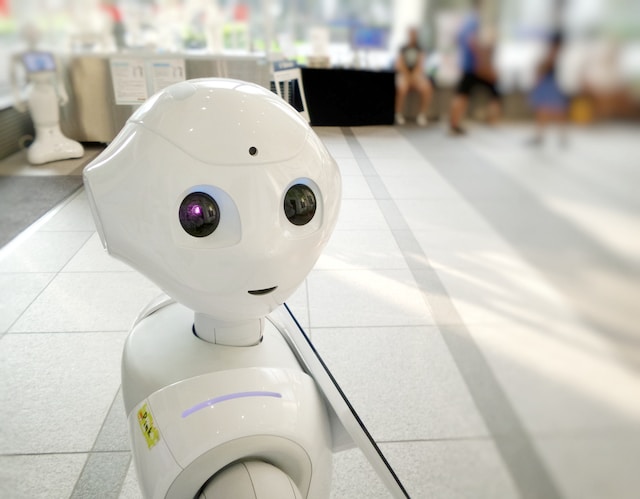Exploring the Versatility of Artificial Intelligence: Applications and Advantages

The proliferation of Artificial Intelligence (AI) technology in the modern world has altered every aspect of human life, from mundane daily tasks to intricate industrial processes. AI has swiftly incorporated into virtually all our living spheres, delivering impressive improvements in efficiency, accuracy, and functionality. As you delve into this article, you will gain a comprehensive understanding of the multifarious uses of AI across various sectors.
The following sections will provide insights into how AI has been beneficial in diverse fields such as healthcare, finance, transportation, education, and many more. Brace yourself for an exciting journey into the world of AI and its wide-ranging applicability.
Table of Contents
Healthcare: AI in Diagnostics and Patient Care
As our understanding of data-driven technology expands and evolves, we, as a society, can benefit enormously. Let’s delve into one of the most impactful areas of AI application: healthcare. Here, we’ll explore how AI is transforming the terrain of diagnostics and patient care.
Revolutionizing Diagnoses
AI innovations, particularly machine learning algorithms, have given hospital systems the ability to analyze complex data sets and detect patterns that can lead to early, and often more accurate, diagnosis of diseases. IBM Watson Health, for example, reads countless medical papers at a speed and detail level no human could manage, offering diagnoses based on the information processed. Beyond enabling faster diagnoses, AI can deal with diseases like cancer by identifying subtle differences in imaging scans that might escape the human eye.
Improving Patient Care
In addition to diagnosis, AI is making significant strides in patient care. Artificial Intelligence-powered virtual assistants can provide quick and accurate answers to patients’ queries, improving communication between patients and their healthcare team. Moreover, remote patient monitoring via AI enables physicians to keep a watchful eye on patients with chronic diseases, assessing health trends and evaluating risks before they escalate into major issues.
A great example of AI in patient care is in the field of mental health. Artificial Intelligence applications like chatbots assist in providing mental health support by simulating therapeutic conversations, aiding in stress relief and anxiety management.
Artificial Intelligence: The Future of Healthcare
AI is, without a doubt, revolutionizing healthcare. The advent of algorithms and machine learning is enhancing the capabilities to detect, diagnose, and treat diseases, all while improving care and outcomes for patients. As we move forward, we can expect to see further advancements in AI’s potential to aid in healthcare, making it an exciting and promising sector to watch.
Finance: AI in Risk Assessment and Fraud Detection
Artificial Intelligence (AI) has significantly reworked the financial industry’s landscape, introducing enhancements in risk assessment and fraud detection. By allowing for quicker, more accurate decision-making, AI has proven to be an indispensable tool in finance.
Risk Assessment
AI has revolutionized the way financial institutions handle risk assessment. Traditionally, risk assessment required heavy human intervention, with analysts sifting through piles of data to conclude a person’s or business’s creditworthiness. With AI, the process has been streamlined and expedited.
Today, sophisticated AI algorithms can analyze financial data and accurately predict future trends, giving a more precise understanding of potential risks ahead. Advanced machine learning models can also assess the risk level of finance transactions in real time. This rapid, efficient risk assessment allows financial institutions to make informed lending and investment decisions, thereby significantly reducing the risk of loss.
Fraud Detection
Each year, financial fraud causes massive losses for businesses and consumers alike. However, AI has brought new levels of security and protection against fraudulent activities. With machine learning, AI systems continuously learn from historical financial transactions to detect unusual patterns and behaviors indicative of fraud.
Through real-time processing and analysis, AI can quickly identify suspicious activities and notify authorities, allowing for immediate action to prevent potential fraud. It’s significantly reducing the time taken to identify and resolve these issues, which is paramount in safeguarding financial assets.
In the era of digital banking, AI-powered cybersecurity solutions have become more important than ever. AI ensures secure transactions by detecting anomalies, such as unauthorized access or unusual transfer activities, thereby protecting users against cybercrime.
The Future of Finance with AI
The applications of AI in finance are expected to continue growing. Developments in machine learning and sophisticated algorithms may even lead to AI systems controlling the majority of financial transactions in the future, managing everything from investments to loans. While this may seem intimidating, it promises increased efficiency, reduced human error, and a greater level of safety in the finance sector. The incorporation of AI is not just an innovative step forward, but an essential one.

Transportation: AI in Autonomous Vehicles and Traffic Management
The transportation sector is not left behind in the application of Artificial Intelligence. The reach and impacts are broad, especially in the areas of autonomous vehicles and traffic management. Let’s explore these revolutionary contributions.
Autonomous Vehicles
In the auto-industry, AI is transforming the concept of the vehicle itself. Self-driving or autonomous vehicles rely significantly on Artificial Intelligence to function. These vehicles use sensors and onboard analytics to capture and analyze information about their environment fast, instantaneously transmitting it to the AI system, which then responds accordingly making navigation decisions.
These systems use machine learning algorithms, a subset of AI, to improve over time; the more they are used, the better they become. This usage and subsequent improved performance over time reduce the likelihood of accidents, optimizing safety, and efficiency on the roads.
Traffic Management
When it comes to traffic management, AI is drastically improving the efficiency of traffic flow, contributing to a reduction in congestion and resulting in significant time and cost savings for commuters. Smart traffic management systems powered by AI traffic sensors can monitor traffic in real-time, adjusting traffic light sequences and rerouting traffic to less congested areas when required.
Moreover, AI can assist in identifying patterns and predicting potential traffic hotspots, allowing officials to take pre-emptive action. This immense potential leads to a future with fewer jams, reduced idle, times decreased carbon emissions and more efficient transport networks.
The Future of Transportation with AI
AI is undoubtedly paving the way for a new era of transportation. Expert anticipations for the future include high-level autonomy where vehicles will be fully self-driving, requiring zero human intervention, leading to safer, more reliable and efficient transportation.
Additionally, smart traffic management systems are set to become more effective and efficient with advancements in AI and data analytics, producing a transport ecosystem where traffic is well regulated, and congestion significantly reduced.
Education: AI as a Tool for Adaptive Learning
Education has never been a one-size-fits-all affair. With the introduction of Artificial Intelligence (AI), the personalization of educational experiences has taken a drastic turn for the better. AI’s gift to the education sector comes predominantly in the form of adaptive learning.
What is Adaptive Learning?
Adaptive learning is a method that aims to provide personalized learning experiences by using AI algorithms. It seeks to tailor learning material to the individual’s knowledge level, speed, and learning style, breaking away from the traditional model of learning. With AI facilitation, learning becomes a pioneer of personal growth rather than just acquiring formal education. However, it doesn’t stop there.
AI’s Role in Adaptive Learning
AI plays an essential role in the adaptive learning system. It works in the background, assessing a student’s progress, identifying gaps in understanding, and adjusting the teaching materials accordingly. This means that every student can progress at their own pace and receive attention and resources specific to their learning needs. In addition to collecting and analyzing data, AI can also provide feedback and suggestions to teachers, helping them understand the learning needs of each student better.
Efficiency and Personalization
AI’s endearing feature is its efficiency to handle vast amounts of data, which is a major player in personalizing education. Being able to identify a learner’s strengths, weaknesses, preferred learning styles, and speed bodes well in maximizing his or her learning potential.
The Benefit of AI in Adaptive Learning
The benefits of AI in adaptive learning are multifold. When AI is mixed with adaptive learning, it leads to better outcomes for both students and teachers. For students, it means personalized learning experiences, better engagement, and improved results. For teachers, AI helps to track individual student’s progress, saving their time and allowing them to provide more nuanced guidance.
The Future of Education with AI
While we are only at the onset of the AI revolution in education, there’s no denying that it’s set to turn things around. The amalgamation of AI and adaptive learning not only alleviates the learning experience but also makes it accessible for everyone. As we move forward, we can envision a future where AI-aligned adaptive learning becomes a standard in the education system, striving for optimized, personalized, and inclusive education for all.







